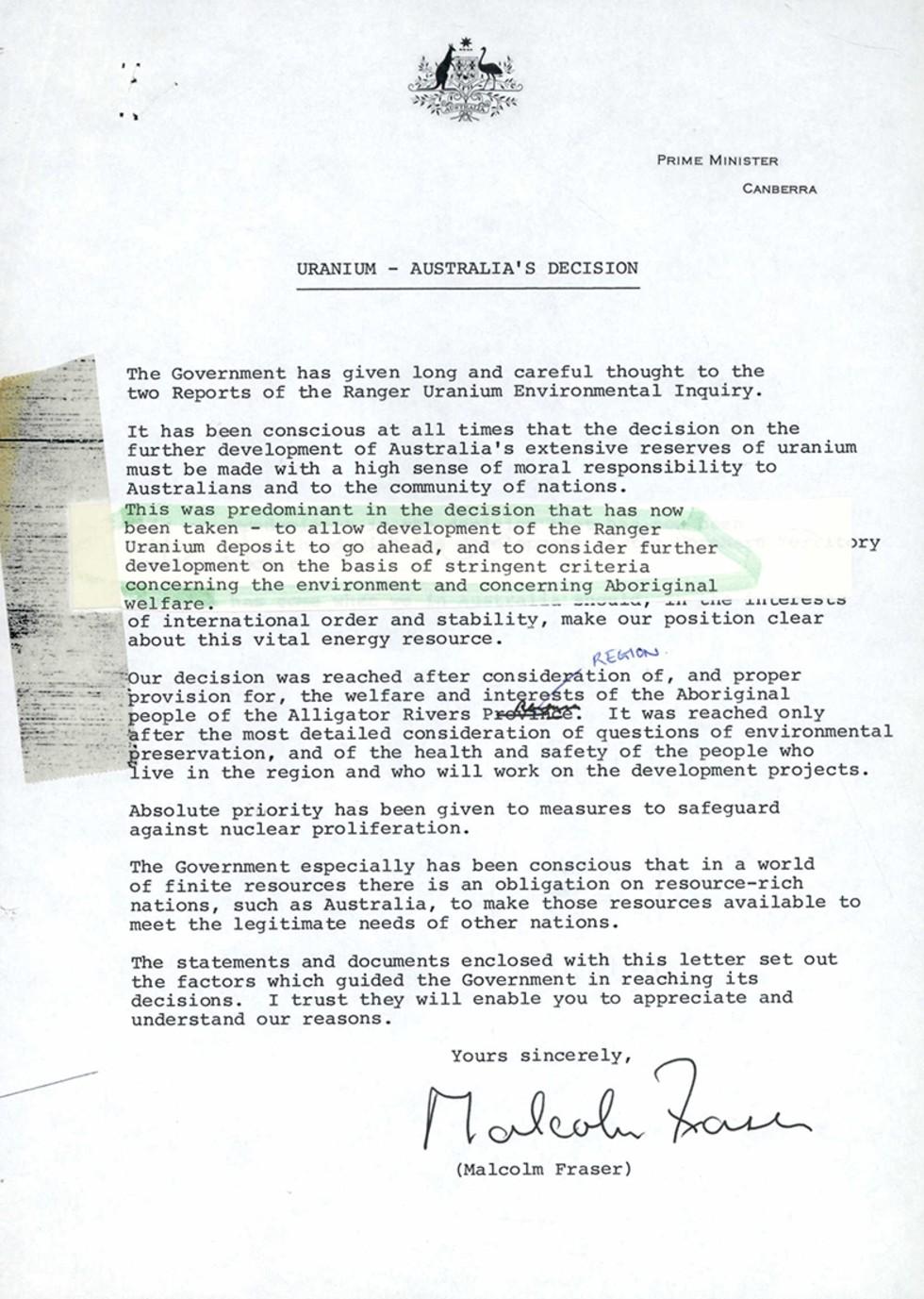


Transcript
[Letterhead with Australian coat of arms and the text 'PRIME MINISTER', 'CANBERRA'.]
[Underlined heading:] URANIUM – AUSTRALIA'S DECISION
The Government has given long and careful thought to the two Reports of the Ranger Uranium Environmental Inquiry.
It has been conscious at all times that the decision on the further development of Australia's extensive reserves of uranium must be made with a high sense of moral responsibility to Australians and to the community of nations.
[A piece of paper has been attached to the page, covering the next paragraph. The text on the paper is circled in green highlighter and reads:] This was predominant in the decision that has now been taken – to allow development of the Ranger Uranium deposit to go ahead, and to consider further development on the basis of stringent criteria concerning the environment and concerning Aboriginal welfare. [End attached section.]
Our decision was reached after consideration of, and proper provision for, the welfare and interests of the Aboriginal people of the Alligator Rivers Province [the word ‘Province’ has been crossed out and replaced with 'Region']. It was reached only after the most detailed consideration of questions of environmental preservation, and of the health and safety of the people who live in the region and who will work on the development projects.
Absolute priority has been given to measures to safeguard against nuclear proliferation.
The Government especially has been conscious that in a world of finite resources there is an obligation on the resource-rich nations, such as Australia, to make those resources available to meet the legitimate needs of other nations.
The statements and documents enclosed with this letter set out the factors which guided the Government in reaching its decisions. I trust they will enable you to appreciate and understand our reasons.
Yours Sincerely,
[Handwritten signature:] Malcom Fraser
(Malcolm Fraser)
About the record
This document, prepared in August 1977, is from former Prime Minister Malcolm Fraser’s personal papers. From the changes pasted over the original text and those added in blue pen, it appears that Prime Minister Fraser made amendments while finalising the statement. The document explains the conditions included in the Australian Government’s decision to allow Australian uranium to be mined and exported.
Educational value
- Uranium is a naturally occurring chemical element (like silver or gold) which is found in rocks, soils, rivers and oceans. To extract it, miners must first create a large pit by blasting and drilling away 'overburden'—the unwanted material that covers or surrounds a uranium deposit. The uranium is then used for producing electricity through nuclear power reactors; for radioisotopes used in diagnosing and treating certain medical conditions; for scientific research; and in nuclear weapons.
- Australia possesses large uranium resources—approximately one-third of the total known reserves in the world. Many of these resources are concentrated in or around the area of Kakadu National Park in the Northern Territory, which is recognised as a World Heritage site for its unique natural and cultural value.
- The Whitlam Government established the Ranger Uranium Environmental Inquiry in 1975 to look into whether Australia should mine and export uranium. The report of this inquiry informed the decision to allow the further development of uranium mining in Australia.
- Environmental groups are concerned about the environmental destruction caused by mining uranium, particularly given the extensive clearance of soil and vegetation that is required to access uranium deposits. As a result of the 1977 decision, mining at the Ranger and Jabiluka uranium sites commenced. Both are surrounded by Kakadu National Park—but do not technically fall within its protected area as they were specifically excluded when the park was created in 1981.
- Uranium mining has also been controversial due to the threat of nuclear proliferation. At the time of Malcolm Fraser’s decision to allow uranium mining and export, Australia was already a signatory to international agreements on non-proliferation. However, it was still feared that Australian uranium might end up in nuclear weapons if it was exported.
- The Australian Government decision provided that consultation with Aboriginal traditional owners of the land had to take place before any mines could be established. Although Indigenous leaders eventually agreed to the mining operations at Ranger and Jabiluka, many have since questioned how fair the process of negotiation was.
Related themes
Need help with your research?
Learn how to interpret primary sources, use our collection and more.





